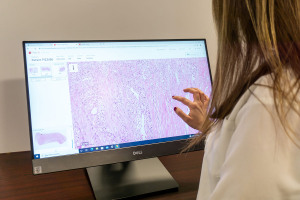PathAI's new digital pathology platform adopted at 13 healthcare facilities
by
John R. Fischer, Senior Reporter | March 16, 2023

AISight (photo courtesy of PathAI)
PathAI's new web-based digital pathology solution, AISight, which uses artificial intelligence to manage and analyze whole slide images in regulated clinical trials or translational research, is now being used by 12 healthcare providers in the U.S.
Early adopters include leading academic medical centers, health systems, reference laboratories, and independent pathology organizations. These facilities are also utilizing the company’s AIM-PD-L1 NSCLC RUO algorithm, which quantifies the percent of PD-L1 positive tumor and immune cells in non-small cell lung cancer (NSCLC) samples across whole slide images.
"We recognize the benefits that digital pathology will provide to pathologists, oncologists and other clinicians, but there are still barriers to its adoption that need to be overcome, such as cost and confidence in algorithm performance," said Dr. Douglas Hartman, vice chair of pathology Informatics at UPMC. "PathAI has a deep understanding of these obstacles, as shown by their significant investment in creating a simple and intuitive user interface to easily interpret the outputs of their algorithms.”
AISight is a cloud-native solution that is interoperable with major scanners and has an interface that facilitates multiperson and multisite collaborations.
The platform automatically assesses whole slide image files and metadata generated from scanned glass slides with algorithms to produce insights. Pathologists can then review these findings and automatically generate reports.
The AIM-PD-L1 NSCLC RUO algorithm allows labs to use additional immunohistochemistry quantitative algorithms in breast cancer, urothelial carcinoma, head and neck squamous cancer, and melanoma care.
The solution assesses NSCLC surgical specimens stained with any of the four major clones, quantifying and visualizing PD-L1 positivity on tumor and immune cells. This information can be applied in immune oncology research applications.
It is powered by convolutional neural networks trained on a diverse real-world data set of more than 5,000 samples and input from over 350,000 cell and tissue-level annotations from over 50 pathologists.
PathAI has published data in Modern Pathology that indicates a potential for such algorithms to be able to identify more patients who would benefit from immuno-oncology therapy than already recommended by manual assessments based on current guidelines.
The facilities that are now using AISight include Caris Life Sciences; NeoGenomics Laboratories; TriCore Inc.; Celligent Diagnostics; PathAI Diagnostics; PathGroup; Baylor Scott & White Health; Cleveland Clinic; Inova Health; Medstar Health; Penn State Health; SUNY Upstate Medical University; and the University of Pittsburgh Medical Center.
"This network of laboratories will serve as pioneers in transforming anatomic pathology and will be the first to access PathAI's extensive and growing menu of algorithm products across oncology and non-oncology indications,” said Dr. Andrew Beck, co-founder and CEO of PathAI, in a statement.
|
|
|
You Must Be Logged In To Post A Comment
|
